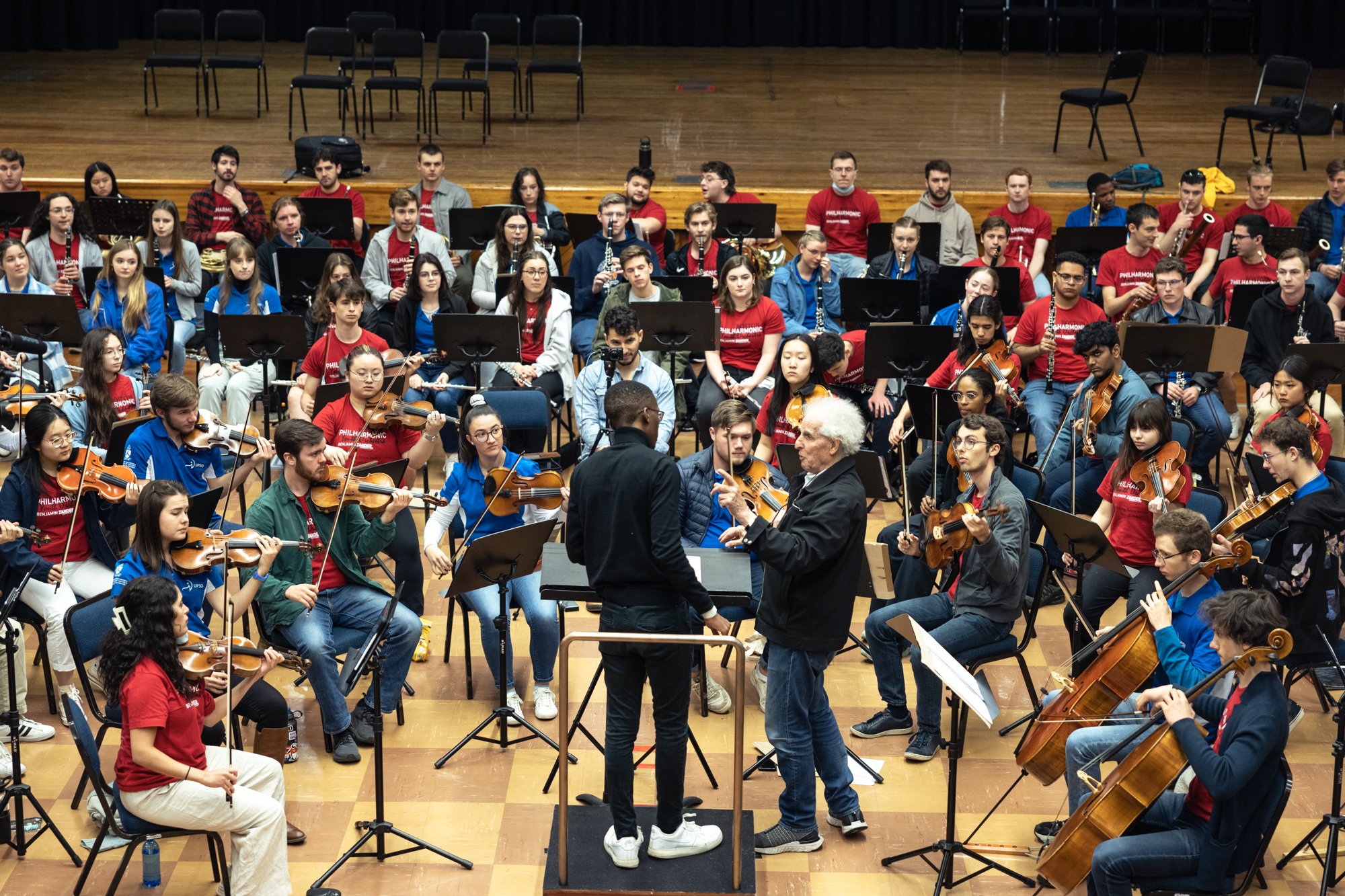
Benjamin Zander coaching a conducting student during he BPYO’s side-by-side/conducting masterclass at University of Pretoria on Wednesday morning.
No sooner had our group begun to adjust to the change of time and scenery in Pretoria than the musical portion of our journey got underway in earnest. And it began, if not exactly with a vengeance, then with a good bit of intensity.
The first demonstration of that came in the form of a joint conducting masterclass/side-by-side on Wednesday morning with the orchestra from the University of Pretoria at UP's Groenkloof campus. Four conductors worked through excerpts by Elgar and Beethoven, Benjamin Zander offered his critiques and pointers, and the whole thing wound up with an energetic run-through of The Stars and Stripes Forever (in which the bass trombones and tubas seemed to be having a little more fun than usual with their half-step licks at the beginning).
That evening the whole orchestra headed to Johannesburg to rehearse the end of Mahler’s Second Symphony with the Gauteng Choristers. Whatever concerns might have lingered about the choir’s vocal stamina were pretty quickly put to rest: they more than held their own with the BPYO in the finale’s peroration. What’s more, the quiet bits sounded even more secure than when we’d left them on Tuesday and the instrumental doublings seemed to really assist the voices in some of the work’s trickier, contrapuntal passages.
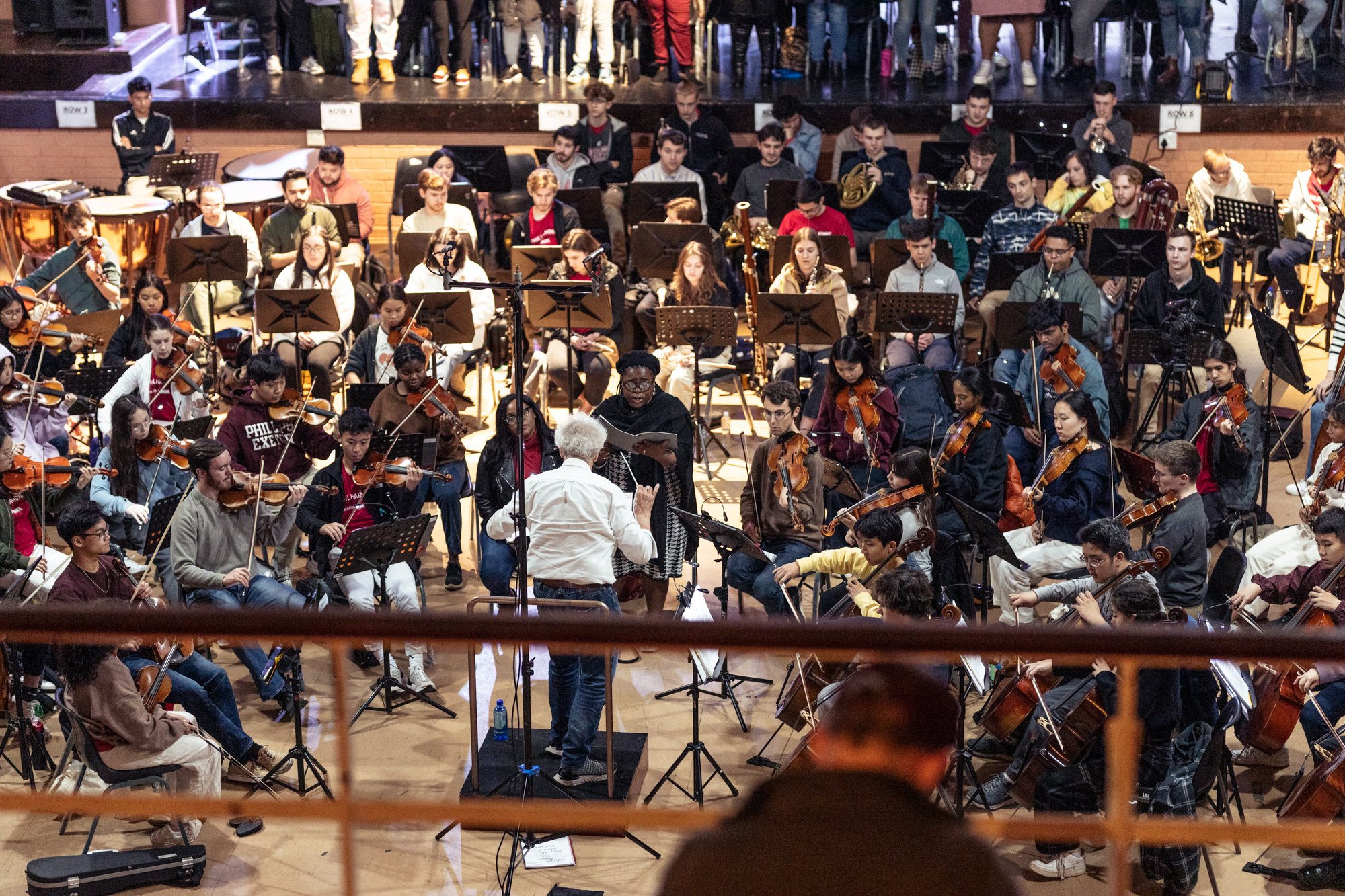
The BPYO rehearsing with the Gauteng Choristers in Johannesburg on Wednesday night.
All in all, the piece looks to be headed in the right direction, even though the orchestral brasses threatened to drown out the choir behind them (in their defense, the rehearsal venue is anything but an acoustical marvel). Not to worry, the Choristers’ publicist told one of our chaperones: they’re holding back for the concerts. In other words, they’ll be fine; we might be the ones getting blasted out of the water (and, given some of the singing we’ve already heard in this country, that wouldn’t be entirely surprising).
It wasn’t until Thursday morning, just hours before the BPYO’s first concert, that the orchestra finally got to sit down and rehearse that evening’s program of Beethoven’s Fifth Symphony and Strauss’s Ein Heldenleben. That it had been a few days since they’d last met with these notes as a group was evident: some spots sounded rusty.
But Ben wasn’t unduly worried. And, in the end, he was proven entirely correct: the night’s performance was about as secure, energized, and focused as any the orchestra’s given in Boston this season.
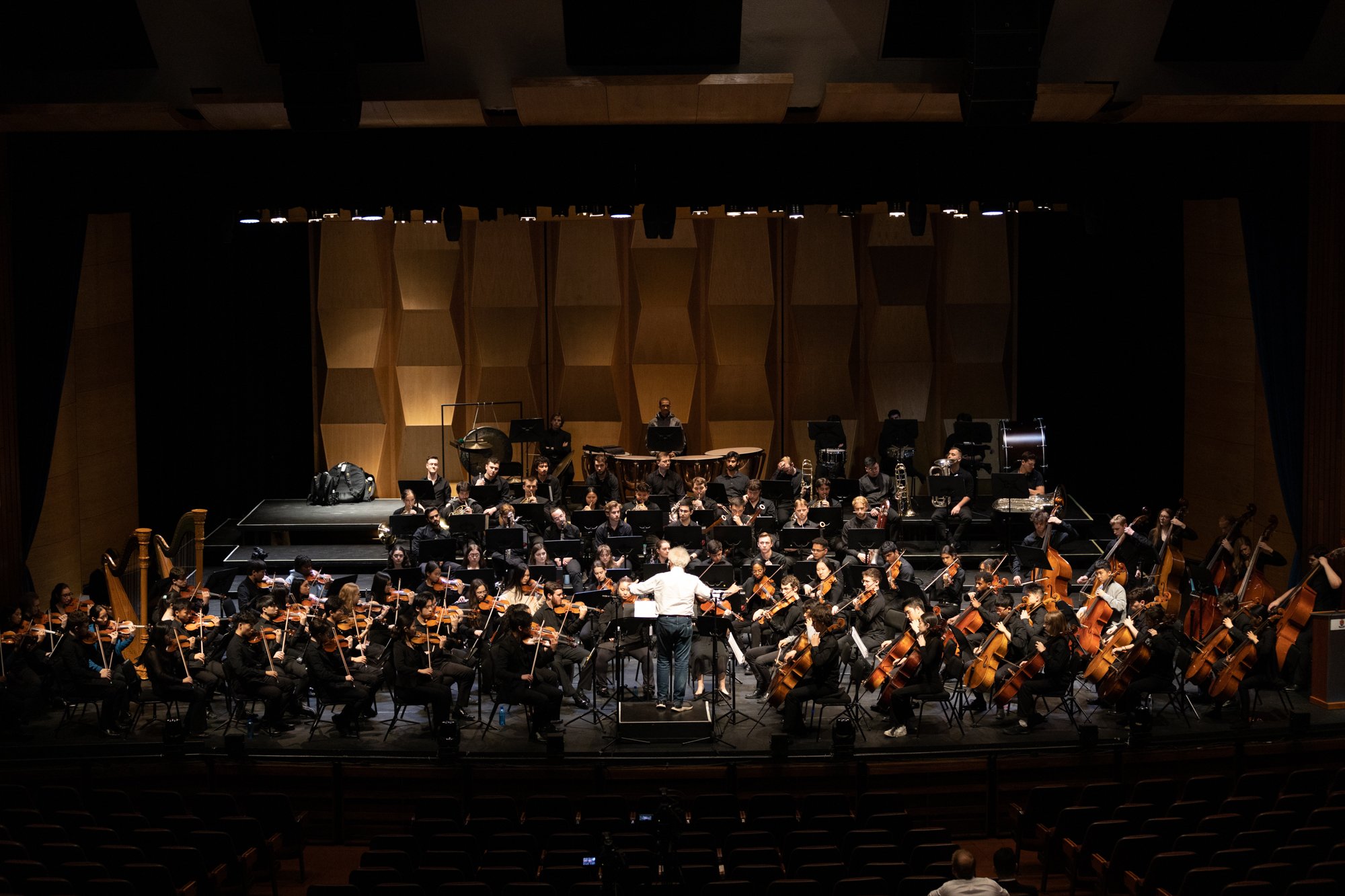
Sound check in the Aula Theater on Thursday night.
It was good to hear the BPYO in a proper concert venue, too. Granted the Aula Theater (on the University of Pretoria’s Hatfield campus) has a pretty dry acoustic. The blessing and curse of such a space is that everything can be heard.
In the Beethoven, this meant that the individual instrumental families didn’t always blend well with others. Dynamics, too, needed to be exaggerated, and entrances that were played a fraction of a second before the beat emerged more readily than they would have in friendlier confines.
Even so, this Fifth was vivifying. One of the benefits of Ben’s approach to this fare is that he doesn’t try to overemphasize what’s already in the score; his aim is basically to get the orchestra to the point where they trust the music and, in a sense, it plays itself. What that means in this piece is that all the turbulence and drama of the first movement is present and forceful. But its moments of playfulness and repose – and there are several of these – are allowed to speak up and simply be themselves.
This pays dividends in the Andante con moto, which is the Allegro con brio’s polar opposite, flowing, graceful, songful. On Thursday, it also danced freshly. Even the Scherzo, though it turns shadowy here and there, is more impish than not. That quality emerged in the lusty fugal sequence around the middle but it was the tight, quiet intensity of the transition into the finale that really carried the day.
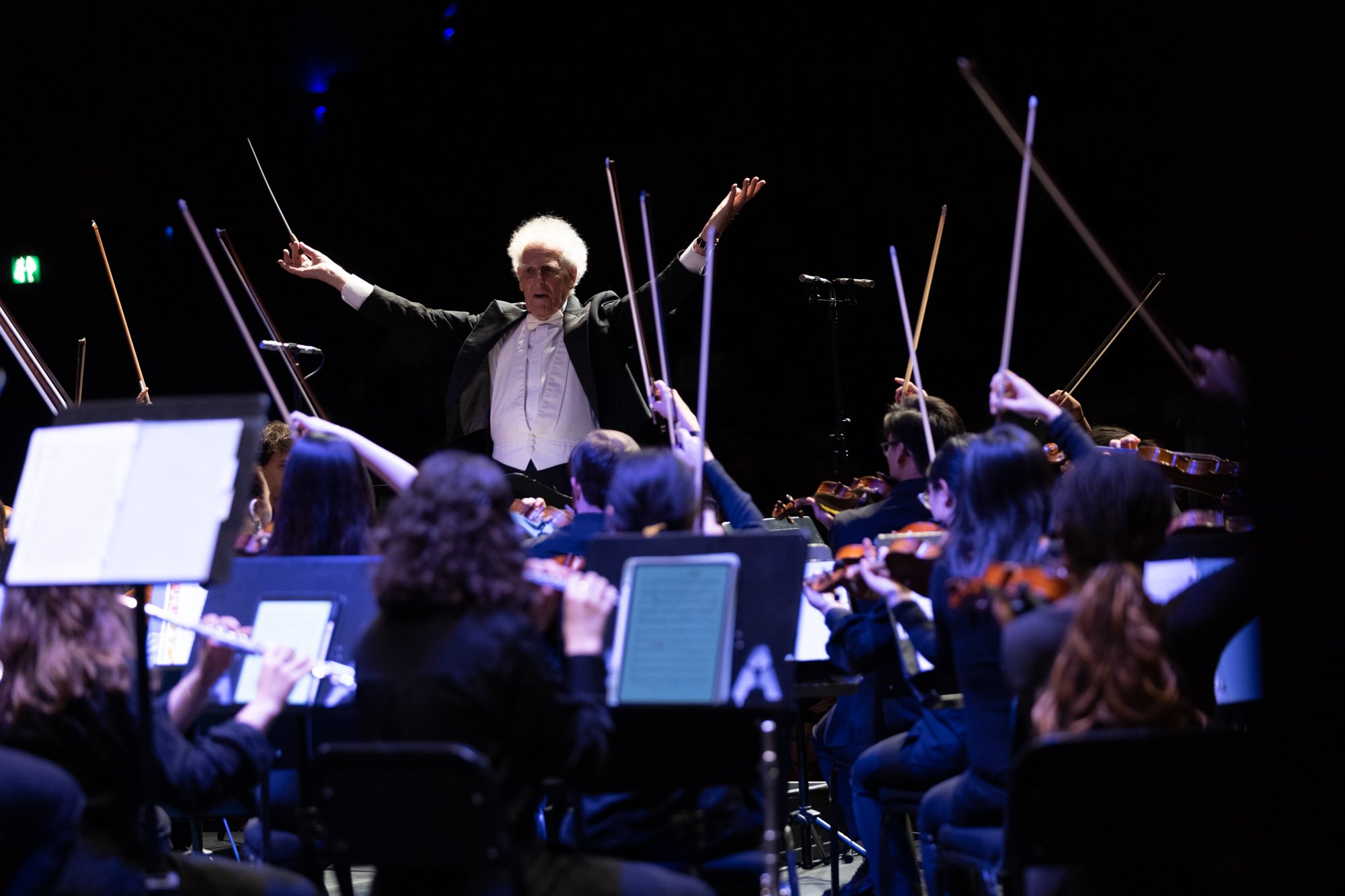
Benjamin Zander conducting the BPYO in Beethoven’s Fifth Symphony at Pretoria’s Aula Theater.
Remarkably, then, despite not weighting down the first three movements with portentous, gloomy forecasts about battling with Fate or some such menacing phantasm, this section came over as triumphant as ever. The orchestra’s whole effort, in fact, felt rousingly Beethovenian.
For its part, Thursday’s Ein Heldenleben was thoroughly Straussian. There are times one can prattle on too much about how challenging this piece or that is. Not so Heldenleben: its demands are truly ferocious. Like the Acropolis and Carnegie Hall, it can stand a repeated charge.
On Thursday, again, the hall wasn’t the orchestra’s most trustworthy friend: playing music like this in a place that exposes your sound so gleefully is a bit like engaging in a high-speed chase on the precipice of a cliff (think the musical equivalent of Tom Cruise going after Rebecca Fergussen in Mission Impossible – Rogue Nation. Only without the wipeout at the end).
The upside, though, was that many of its moving parts emerged. And, in this piece, that can be truly revelatory. The Hero’s theme, for instance, had terrific swagger and was beautifully dovetailed across the orchestra. The battle music didn’t once dissolve into chaos; in fact, you could hear each of the primary leitmotivs in combat with one another (even more remarkable: many of the skittering string figures that are nearly always shrouded in bedlam were audible).
Additionally, all the big moments – highlighted by the horns nailing the high E-flats just before the start of “The Hero’s Works of Peace” – landed with total control. If a musical performance can, somehow, be heroic, this was one.
But the star of the show was concertmaster Michael Fisher. For beauty of tone and accuracy of pitch, his solos were absolutely monumental. This was the first time Michael had ever played the Heldenleben solos in concert and, surely, his interpretation of it will grow with time. But it’s starting from a place of deep understanding and incredible musicianship. I can’t wait to hear him do it again next Wednesday in Cape Town.
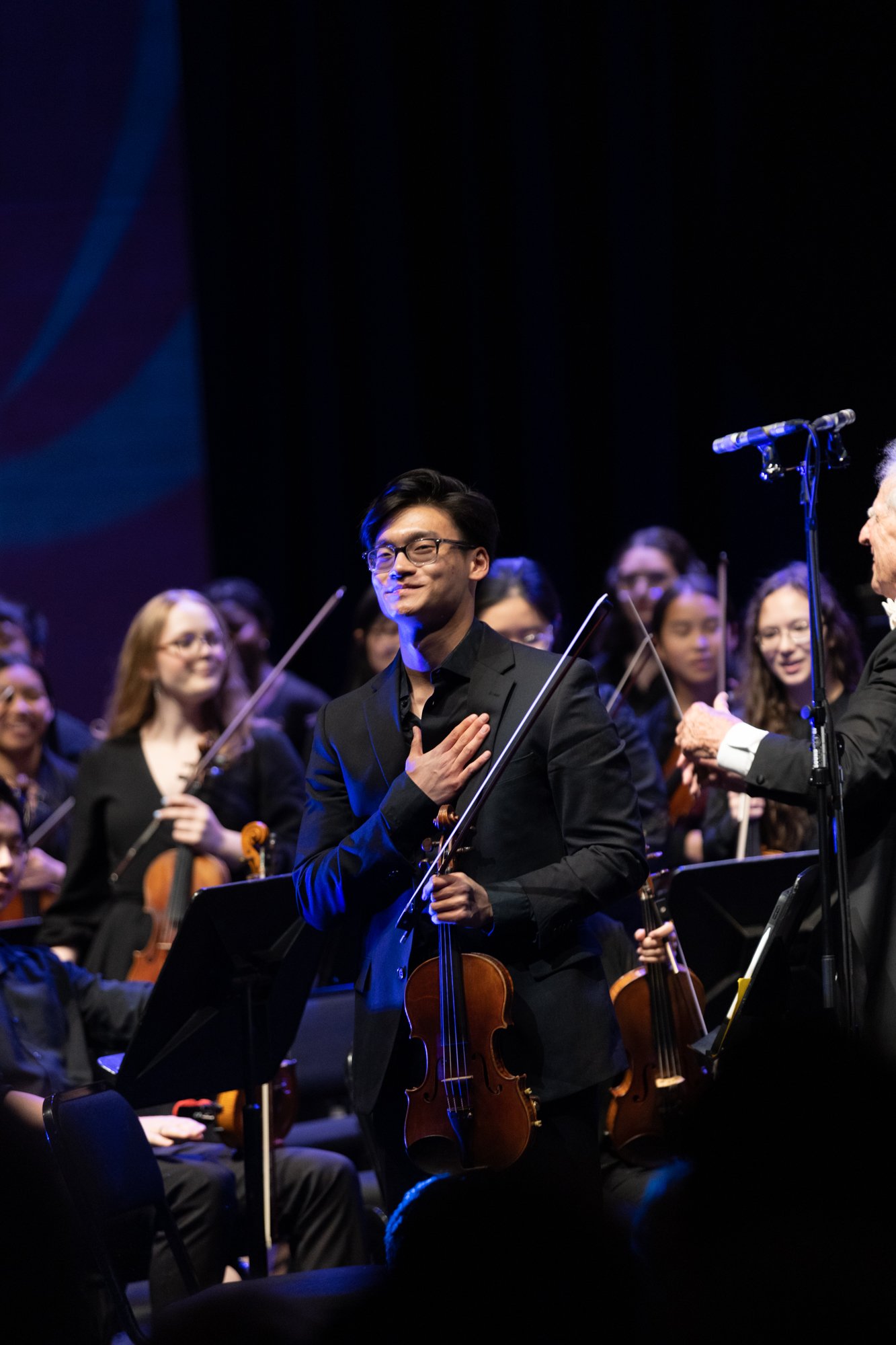
Concertmaster Michael Fisher taking one of his bows Thursday night.
Afterwards came ovations from the sold-out house, the obligatory “Nimrod” encore, and an invitation from the podium for members of the night’s audience to come to Saturday’s Mahler concert in Soweto. The last was met with something approaching consternation from many in the audience, as became evident in conversations had in the lobby post-concert: that township is notoriously dangerous after dark.
It brought home at least one of the realities of South Africa. For all the kindnesses we've received and all the talk of reconciliation and building for the future we've heard, the threat of physical violence and robbery in certain places at certain times here is real. (Our group is somewhat shielded from the worst of this, since we’re usually traveling by bus and have security plans in place.) So it’s unlikely many from Thursday will reappear on Saturday.
That said, it won’t be due to any shortage of enthusiasm. “You have no idea how extraordinary this was for us,” a woman in the audience said to me after providing cautionary advice about going to Soweto. “We lack quality orchestras and ensembles here. This concert was food for our souls.”
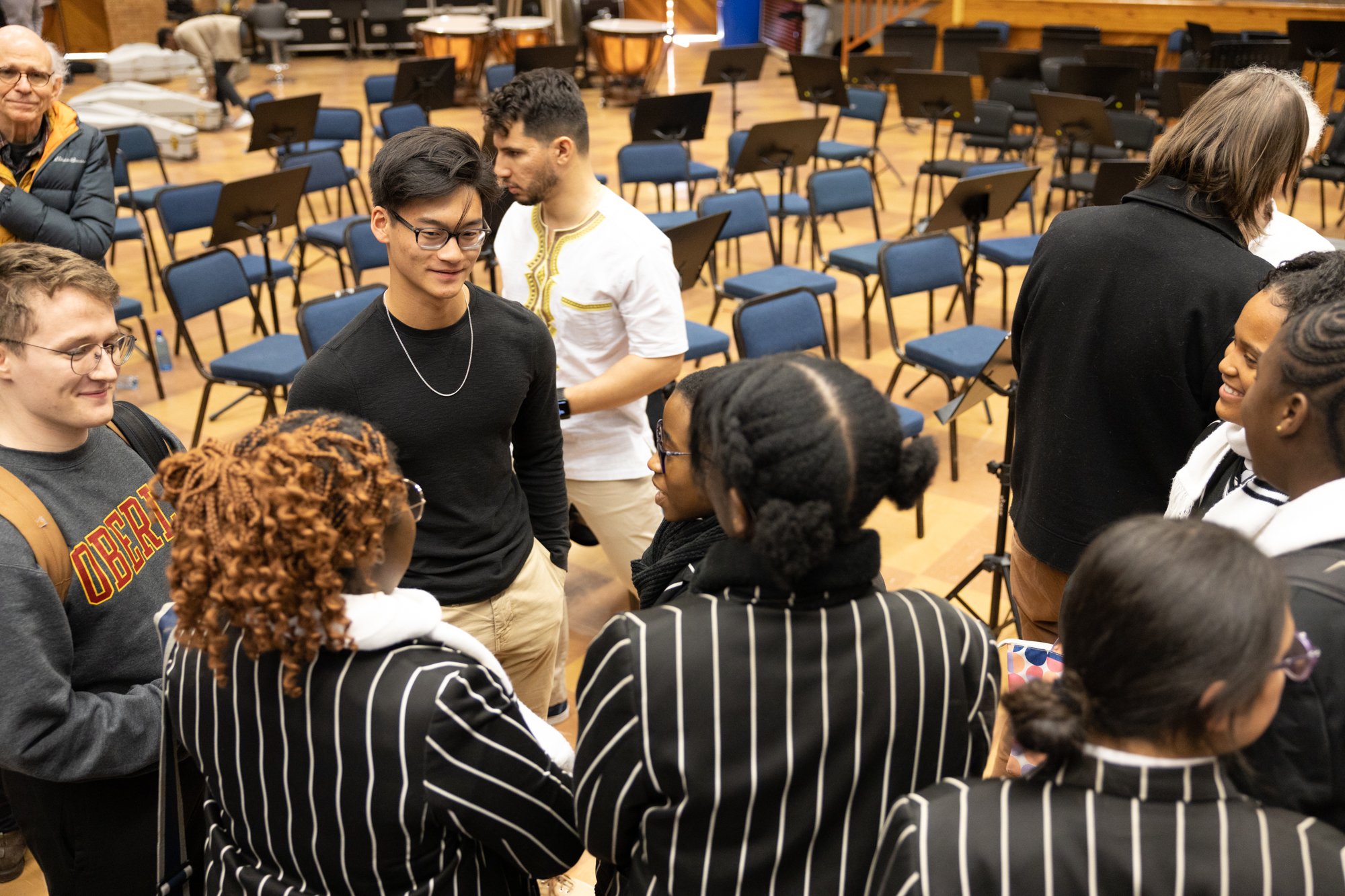
BPYO violist Chris Broyles (r) and violinist Michael Fisher (l) talking with local music students after rehearsal at the University of Pretoria on Thursday.
Photo credits: Paul Mardy.




